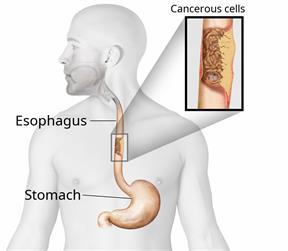Cancer of the Throat (Esophageal Cancer): What to Know

Cancer of the throat, or esophageal cancer, is when you have a growth of cancer cells in your esophagus. Your esophagus is the part of your body that moves food and liquids from your mouth to your stomach.
What are the causes?
The exact cause of this cancer isn't known.
What increases the risk?
You may be more likely to get this type of cancer if:
- You have a problem that hurts or irritates your esophagus, such as:
You're older than 55 years of age.
You're male.
Your esophagus has been hurt by poisons (toxins).
You've had a kind of cancer in the past.
You smoke or drink a lot of alcohol.
You don't eat enough fruits and vegetables.
You're overweight.
What are the signs or symptoms?
Symptoms may include:
How is this diagnosed?
You may be diagnosed based on an exam and your medical history. You may also need tests or procedures, such as:
An endoscopy. This is when a tube with a light and camera on the end of it is used to look at your throat and esophagus. It may also be used to check if the cancer has spread.
A biopsy. This is when a small piece of tissue is removed for testing.
A barium swallow study. This is when you swallow a solution called barium and X-rays are done to check your esophagus. The barium shows up well on the X-rays.
X-rays, CT scans, PET scans, or an MRI scan.
If you're found to have cancer, it will be staged. This means that it will be marked at a certain level based on how bad it is and how much it has spread.
How is this treated?
Treatment depends on the type and stage of the cancer. You may need:
- Surgery. Surgery may be done to:
Get rid of abnormal growths of cells called tumors.
Remove part of the esophagus.
Remove part of the esophagus and the upper part of the stomach.
Chemotherapy, which uses medicines to kill cancer cells.
Radiation, which uses high-energy rays to kill cancer cells.
- Medicines to:
Target certain parts of cancer cells and the area around them. This is called targeted therapy. It can help limit damage to healthy cells.
Help your body's disease-fighting system (immune system) fight the cancer cells.
Endoscopic mucosal resection. This is when an endoscope is used to remove part of the inner lining of the esophagus.
Photodynamic therapy. This is when you're given medicine through an IV and then an endoscope with a special light is used. The light destroys the cancer cells.
Radiofrequency ablation. This is when a small balloon is inflated in your esophagus. It uses an electric current to destroy cancer cells.
Follow these instructions at home:
Lifestyle
General instructions
-
Try to eat regular, healthy meals. If you have trouble eating or often don't feel hungry, meet with an expert in healthy eating called a dietitian. They can help you come up with a meal plan.
-
Take your medicines only as told.
-
Think about joining a support group for people who have cancer of the throat.
-
Work with your cancer care team to manage any side effects of treatment.
-
Keep all follow-up visits. Your health care provider will make sure your treatment is working.
Contact a health care provider if:
-
You have more trouble when you eat or swallow.
-
You have new tiredness or weakness.
-
You keep losing a lot of weight without trying.
-
You have a fever.
-
Your pain gets worse all of a sudden.
-
You have trouble breathing.
-
You throw up blood.
-
You throw up something black that looks like coffee grounds.
-
Your poop is black.
-
You faint.
These symptoms may be an emergency. Call 911 right away.
This information is not intended to replace advice given to you by your health care provider. Make sure you discuss any questions you have with your health care provider.
